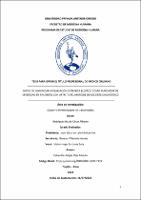Índice de inmunidad - Inflamación sistémica elevado como marcador de severidad en pacientes con artritis reumatoide de reciente diagnostico
Abstract
Evaluar si el índice de inmunidad-inflamación sistémica (IIS) elevado es marcador de severidad en pacientes con artritis reumatoide de reciente diagnóstico del Hospital Víctor Lazarte Echegaray.
Materiales y Métodos: Se realizó un estudio observacional analítico de 151 historias clínicas de pacientes con diagnóstico de artritis reumatoide atendidos en consultorio externo del Hospital Víctor Lazarte Echegaray. Para ello se tomó en cuenta los siguientes criterios de inclusión: pacientes de ambos sexos, mayores de 18 años, atendidos en consultorio externo de reumatología del HVLE y con reciente diagnóstico de AR por criterios EULAR (mayor o igual a 6 puntos), con evaluación de la actividad de la enfermedad por DAS28-PCR y que cuenten con hemograma y PCR tomado dentro de las últimas semanas previas al diagnóstico. Y los siguientes criterios de exclusión: pacientes en terapia inmunosupresora (últimos 30 días) o con neoplasia maligna, embarazo, cirrosis hepática o nefropatía crónica (estadio 4 o 5), diabetes mellitus, VIH/SIDA; así mismo se excluyen a quienes presenten diagnóstico de: fibromialgia, lupus eritematoso u osteoartrosis severa.
Para determinar el IIS se calculó el cociente que se forma al dividir el producto de las plaquetas y neutrófilos por el total de linfocitos, provenientes de un mismo hemograma; y para determinar si este índice puede usarse como marcador de severidad para artritis reumatoide se va a comparar con el DAS 28 ya conocido en esta patología.
Para evaluar los puntos de corte se utilizó T de student para comparar los datos cuantitativos entre los grupos de severidad y no severidad de AR. Para el análisis de las variables categóricas, se empleó Chi-cuadrado de Pearson, determinando significancia si p<0.05, además la fuerza de asociación se determinó mediante el cálculo del odds ratio e intervalo de confianza al 95%.
Resultados: De los 151 pacientes con diagnostico reciente de artritis reumatoide, el Índice de Inmunidad Inflamación Sistémica y DAS28 coincidieron en 78 casos para el resultado de Artritis reumatoide “no severa”, mientras que la coincidencia para los casos de Artritis Reumatoide “severa” fue de 53 casos, representando el 51.7% y 35.1% respectivamente; siendo un total de 131 casos en total (86.8%) lo cual permite afirmar que existe concordancia significativa entre ambos marcadores, pudiendo catalogarse como concordancia considerable.
Conclusión: el Índice de Inmunidad-Inflamación Sistémica elevado puede ser usado como marcador de severidad en pacientes con artritis reumatoide de reciente diagnóstico. To evaluate if the elevated systemic immunity-inflammation index (SII) is a marker of severity in patients with recently diagnosed rheumatoid arthritis at the Víctor Lazarte Echegaray Hospital (VLEH)
Materials and Methods: An analytical observational study of 151 medical records of patients diagnosed with rheumatoid arthritis treated in the outpatient clinic of the Víctor Lazarte Echegaray Hospital was carried out. For this, the following inclusion criteria were considered: patients of both sexes, over 18 years of age, treated at the VLEH rheumatology outpatient clinic and with a recent diagnosis of RA by EULAR criteria (greater than or equal to 6 points), with evaluation of disease activity by DAS28-PCR and those who have a complete blood count and PCR taken within the last weeks prior to diagnosis. And the following exclusion criteria: patients on immunosuppressive therapy (last 30 days) or with a malignant neoplasia, pregnancy, liver cirrhosis or chronic kidney disease (stage 4 or 5), diabetes mellitus, HIV/AIDS; likewise, those with a diagnosis of: fibromyalgia, lupus erythematosus or severe osteoarthritis are also excluded.
To determine the ISS, the quotient formed by dividing the product of platelets and neutrophils by the total number of lymphocytes from the same blood count was calculated; and to determine if this index can be used as a severity marker for rheumatoid arthritis, it will be compared with the DAS 28 already known in this pathology.
To evaluate the cut-off points, Student's T was used to compare the quantitative data between the RA severity and non-severity groups. For the analysis of the categorical variables, Pearson's Chi-square was used, determining significance if p<0.05, In addition, the strength of association was determined by calculating the odds ratio and 95% confidence interval.
Results: Of the 151 patients with newly diagnosed rheumatoid arthritis, the Systemic Inflammatory Immunity Index and DAS28 agreed in 78 cases for the result of “non-severe” rheumatoid arthritis, while the agreement for “severe” rheumatoid arthritis cases was 53. cases, representing 51.7% and 35.1% respectively; being a total of 131 cases in total (86.8%), which allows us to affirm that there is significant agreement between both markers, and can be classified as considerable agreement.
Conclusion: The elevated Systemic Immunity-Inflammation index can be used as a marker of severity in patients with recently diagnosed rheumatoid arthritis.
Collections
- Medicina Humana [2969]


